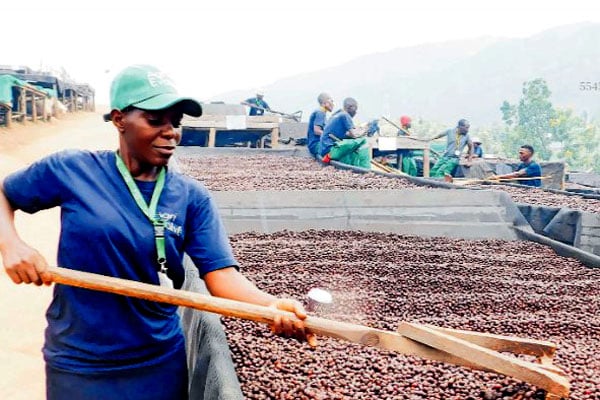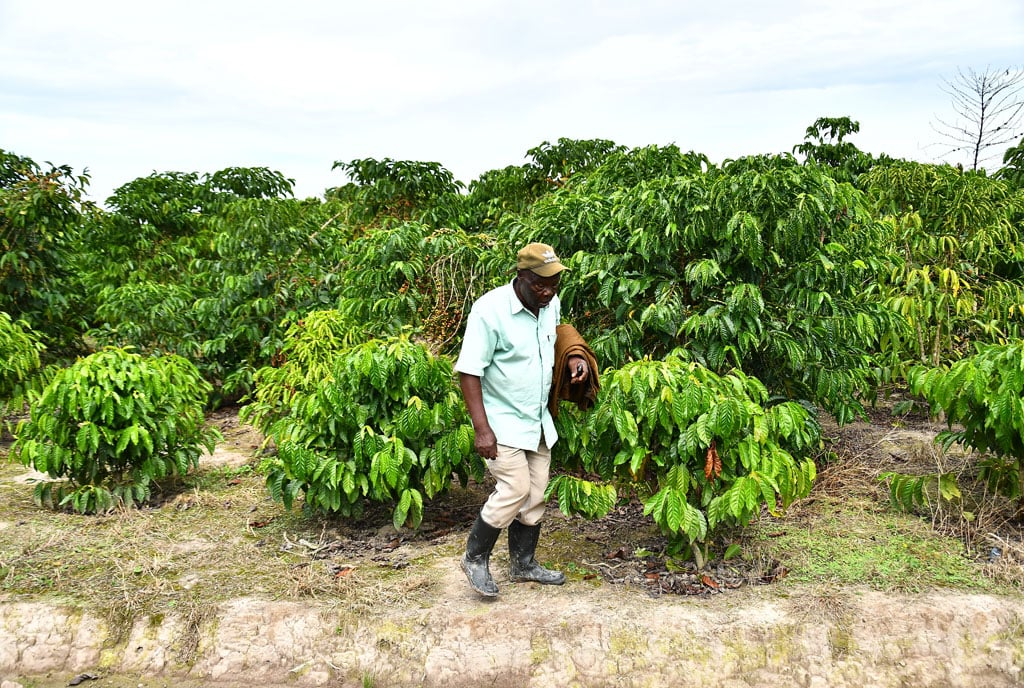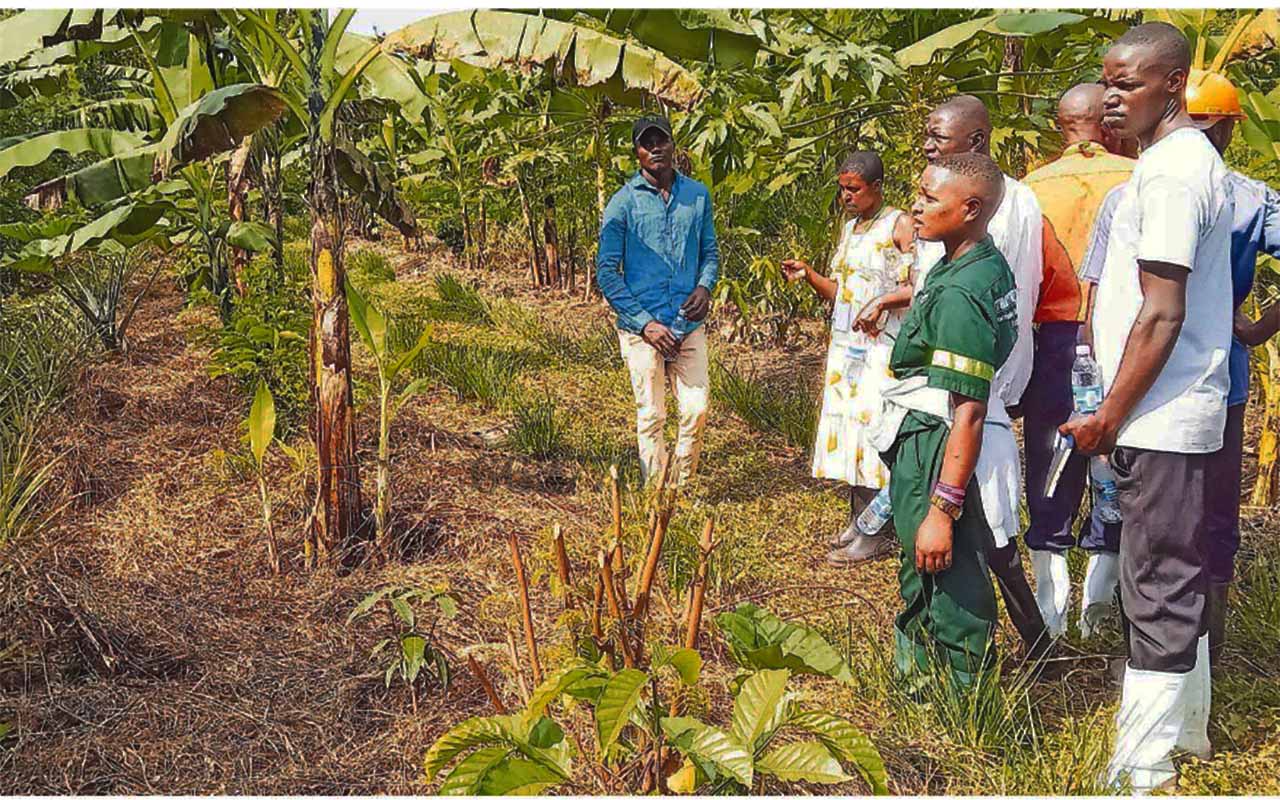
A woman turns coffee drying under the sun. Photo/ Michael J Ssali
The recent sudden rise of coffee prices has been the happiest surprise that coffee farmers have had in many years. “I did not expect to earn so much money in all my life,” said Charles Mulumba who is both a photographer and coffee farmer in Lwengo District. He harvested some 78-kilogramme-bags of dry Robusta coffee and used the money to purchase a new car which occasionally brings him more money when people hire it at various functions.
Nearly everywhere in the coffee producing regions there is noticeable evidence of some economic development. In almost every home there is something new – rainwater harvesting tanks, newly constructed buildings, new motorcycles, new cars, and new enterprises in the form of more land purchased to grow more coffee, and shops opened up in various rural trading centres.
New farmers
More and more people are clearing bushes and digging holes for planting coffee. The European Union is actually concerned that some people are even cutting down natural forests to create space for coffee growing. It has threatened to stop buying any coffee from countries where farmers are destroying natural forests to grow coffee.
Preservation of trees and forests is part of Climate Change mitigation and the EU wants to be seen protecting the natural environment as a form of climate change mitigation.
Coffee, which we are fortunate to produce, is said to be the second most traded commodity globally after oil. It is actually the most traded agricultural commodity in the world. It is also true that Uganda is the birthplace of Robusta coffee which continues to attract more and more drinkers worldwide. This last season Uganda is said to have produced more bags of coffee than the 6.3 million that were produced in 2023 and earned the country $1.25 billion. Why we must empower UCDA?
Hassan Kakooza, a coffee farmer and a member of UNDUGU Coffee Farmers Cooperative Society based in Kabonera Sub-county in Masaka District, believes that if we pay more attention to the coffee crop it has a big potential to finance our national budget and attract tourists into the country, seeking to know more about the origin of the crop. “That is the big reason why we must maintain the Uganda Coffee Development Authority (UCDA) and provide it with stronger capacity to develop the coffee industry as a group of experts, especially devoted to promoting its production in terms of quality and quantity,” he told Seeds of Gold.
He went on to say that our farmers need to be more educated about coffee farming and harvesting practices which requires regular training, inspection, and supervision by an organised organisation like UCDA. So he emphasised the need to keep UCDA around.
It should be the body trusted with registration of all coffee farms and ensuring that natural forests are protected and that agro-forestry and regenerative agriculture are practiced by all coffee farmers. UCDA is mandated to ensure that all regulations and guidelines regarding coffee production and coffee trading are properly put into practice.
According to Kakooza, UCDA should be empowered with more personnel and finance to carry out more supervision of coffee farms to ensure that farmers carry out good agricultural practices by planting clean and high yielding coffee varieties, providing guidance on fighting coffee pests and that they harvest only red ripe coffee cherries. The supervisors should then ensure that the harvested cherries are properly dried under hygienic conditions to the required moisture content of 13 and 14 percent or below.
UCDA mandate
UCDA should be the body to educate all coffee farmers about why they must be registered so that all their gardens are traceable to ensure good quality coffee production.
“In fact when all farmers are registered together with their production capacity coffee theft will greatly reduce because anybody without a garden will not be expected to sell coffee,” Kakooza said. “The farmers will then have the confidence that their coffee will be safe out there in the gardens as they wait for it to ripen properly.
They will no longer be tempted to harvest it in a hurry even before it is ripe, which has been compromising our quality of coffee.”
Kakooza also says UCDA should be the body to bring coffee buyers under control. We have laws governing coffee production and they must be followed to the letter and UCDA should be the main body to spearhead the implementation of the laws. All coffee buyers must be licensed and the license certificate must be clearly displayed. They must have clean, leak proof, stores with cemented floors and which are well-ventilated. They must have good, certified, weighing scales and moisture meters.
They must only buy properly dried coffee of moisture content of 13 and 14 percent or below. No foreign matter should be found in coffee at any stage of the crop’s value chain. Farmers must be educated that coffee is food and that it must be handled as such and we expect UCDA to be in charge of this education. Farmers must not put herbicides and pesticides in the same place where harvested coffee is stored, for example because of the likely risk of the chemicals spilling over the coffee. Just about a week ago Buganda Kingdom launched the holding of various consultative meetings of coffee farmers across all the counties that make up the kingdom to debate ways of increasing coffee production and to explain why all farmers must be registered.
Given its special position in the economy of our country, the coffee crop deserves special attention and a special team of people solely devoted to its production and handling. There is widely observed excitement and expectation associated with the recently discovered commercial volumes of oil in western Uganda. However, it must be born in mind that our way out of poverty is also linked to coffee production. As has been pointed out at the beginning of this discussion both commodities which we are fortunate to produce are the most internationally traded items.
Gerald Ssendawula who is a large-scale coffee farmer and chairman of National union of Coffee Agribusinesses and Farm Enterprises (NUCAFE) said, “Coffee is such a valuable crop that it is yearned for among the rich countries of the West. It is traded on the international market and we need a body that has to be trusted to take on the different day-to-day decisions in real time. Some world market decisions need to be dealt with by an autonomous body such as the UCDA.
If a valuable commodity like coffee is put under a government ministry or department we are likely to be the losers. Some decisions must be taken immediately without waiting for a minister of agriculture that may have gone to a conference overseas and might need to first discuss the matter in a cabinet meeting before announcing the right course of action.
Ssendawula is of the view that the crop should be governed by farmers who are the producers and directed by a team of devoted experts such as UCDA or some organisation like Uganda Coffee Industry, quite separate from a government ministry that is also taking care of animals and fisheries, including fighting livestock disease epidemics and other issues. If UCDA is merged with the Ministry of Agriculture many decisions regarding the coffee trade may never yield any result due to protocol delays. “Coffee trade often requires quick decisions because on the world market prices change abruptly and frequently.”







